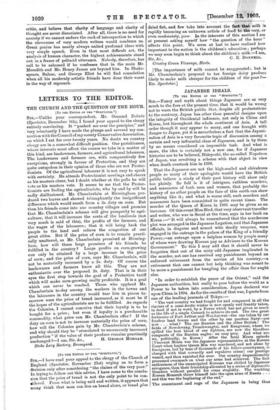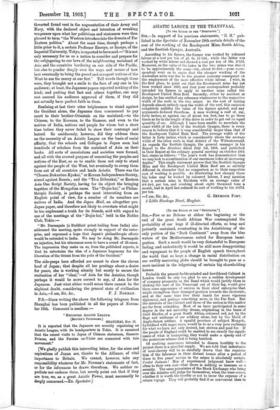JAPANESE IDEALS.
(To THE EDITOR OP THE "SPECTATOR."] SIR,—Fancy and myth about things Japanese are so very much to the fore at the present time, that it would be wrong not to warn the British public that, despite all protestations to the contrary, Japan has other than peaceful designs upon the integrity of Occidental influence, not only in China and
Korea, but throughout the whole continent of .Asia- A tall order though it may appear to many, and one fraught with danger to Japan, yet it is nevertheless a fact that the Japani- sation of Asia is a very favourite topic of discussion among a certain and very influential class of Japanese, and is by them by no means considered an impossible task. And what is more, the idea is certainly not a new one, for if Japanese histories are to be believed, Hideyoshi, the so-called Napoleon of Japan, was revolving a scheme with that object in view when death overtook him in 1598.
That the Japanese are not the high-souled and chivalrous people so many of their apologists would have the British public believe a study of their past history will show only too plainly. So full is it of intrigues, ruthless murders, and massacres of both men and women, that probably the history of no other people on the face of this earth can show anything like it; and what is worse still, such murders and massacres have been committed in quite recent times. The murder of the Queen of Korea in 1895 may be given as an instance. Of this event Miss Bird, that very observant traveller and writer, who was in Seoul at the time, says in her book on Korea :—" It will always be remembered that the murderous plot was arranged in the Japanese Legation, and that Japanese officials, in disguise and armed with deadly weapons, were engaged in the outrage in the palace of the King of a friendly Power,—an outrage upon a helpless woman by people many of whom were drawing Korean pay as Advisers to the Korean Government." To this I may add that it should never be forgotten that out of the sixty odd Japanese implicated in the murder, not one has received any punishment beyond an enforced retirement from the service of his country,—a retirement that one cannot but help thinking was meant to be more a punishment for bungling the affair than for aught else.
"In order to establish the peace of the Orient," said the Japanese authorities, but really to pose before the world as a Power to be taken into consideration, Japan declared war upon China in 1894. As for the results of that war, I quote from one of the leading journals Of Tokyo :—
" The vast country we had fought for and conquered in all the rigours of a semi-Arctic winter is now openly and frankly taken, in deed if not in word, by a Power which has not given so much as the life of a single Cossack to achieve its end. The two great fortresses of Port Arthur and Wei-hai-wei—the one taken by our fearless land troops and the other by our peerless Navy—are now . . . what ? The one Russian and the other British ! The fields of Newchwang, Tienchwangtai, and Kangwasai, where we spilled the best blood of our fighters, are now the bloodless conquests of the Russian eagles : an easy prey. And what are we, politically, in Korea ! After the fatal Miura episode [Viscount Miura was the Japanese representative at the Korean Court when hapless Queen Min was murdered, and not alone by foreigners, but by tens of thousands of his fellow-countrymen, is charged with that cowardly and repulsive crime] our prestige waned, and then vanished for ever. Our country unquestionably presumed overmuch on what our arms had achieved. The first enthusiasm of the emancipated Koreans was chilled by Japanese arrogance, then their friendship alienated by a series of diplomatic blunders without parallel for crass stupidity. The weakling Korean Monarch threw himself into the open arms of Russia . . and this was the beginning of the end."
The resentment and rage of the Japanese in being thus thwarted found vent in the augmentation of their Army and Navy, with the declared object and intention of wreaking vengeance upon what her politicians and statesmen were then pleased to term "the Western intruders into the domain of Far Eastern politics." About the same time, though perhaps a little prior to it, a certain Professor Enouye, or Inouye, of the Imperial University, Tokyo, is reported to have said:—" His not only necessary for us as a nation to consider and prepare for the subjugating to our laws of the neighbouring mainland of Asia and the countries bordering on our side of the Pacific, but also to ponder deeply over the ways and means of how best eventually to bring the proud and .arrogant nations of the West to sue for mercy at our feet." Tall words though these were, they brought not a smile to the face of any one in his audience; at least, the Japanese papers reported nothing of the kind; and putting that fact and others together, one may rest assured his audience approved of them, if they did not actually have perfect faith in them.
Realising at last their utter helplessness to stand against the Occident alone, the Japanese then commenced to pay court to their brother-Orientals on the mainland,—to the Chinese, to the Koreans, to the Siamese, and even to the natives of India, nations and people for whom but a short time before they never failed to show their contempt and hatred. So assiduously, however, did they address them on the necessity of an Asiatic League on the basis of racial affinity, that the schools and Colleges in Japan soon, had hundreds of scholars from the mainland of Asia on their books. All sorts of associations and societies were formed, and all with the avowed purpose of cementing the peoples and nations of the East, so as to enable them not only to stand against the people of the West, but eventually to sweep them from out of all countries and lands Asiatic. There was the "Chosen Dokuritsu Kyokai," or Korean Independence Society, aimed against Russia; and the " To-a Dobunkai," or Eastern Asia One Script Society, having for its object the bringing together of the Mongolian races. The "Dojin-kai," or Philan- thropic Society, is perhaps the most interesting from an English point of view, for a number of its members are natives of India. And the Japan Mail, an altogether pro- Japan paper, and therefore not likely to overstate what might be too unpleasant a truth for its friends, said with regard to one of the meetings of the " Dojin-kai," held in the Nobles Club, Tokio :— " Mr. Darmapala (a Buddhist priest hailing from India) also addressed the meeting, spoke strongly in support of the enter- prise, and expressed a hope that Japan's philanthropic efforts would be extended to India. We may be doing Mr. Darmapala an injustice, but his utterances seem to have a sound of ill-omen. The impression they make on US, from the published reports, is that he entertains the idea of a Japanese hegemony for the liberation of the Orient from the yoke of the Occident."
The side-peeps here afforded are meant to show the cloven hoof of Japan; that despite all her pratings about a desire for peace, she is working silently but surely to secure the realisation of her "ideal,"—of Asia for the Asiatics, though perhaps it would be more correct to say, of Asia for the Japanese. Just what either would mean there cannot be the slightest doubt, considering the general state of civilisation
F.S.—Since writing the above the following telegram from Shanghai has been published in all the papers of Novem- ber 16th. Comment is needless :— " REPORTED ASIATIC LEAGUE.
[RESTER'S TELEGRAMS.] SHANGHAI, Nov. 15.
It is reported that the Japanese are secretly organising an Asiatic League, with its headquarters in Tokio. It is surmised that the recent visits to Japan of Chinese statesmen, Siamese Princes, and the Persian ex-Vizier are connected with this movement."
[We gladly publish this interesting letter, for the aims and aspirations of Japan are, thanks to the Alliance, of vital importance to Britain. We cannot, however, take any responsibility whatever for Mr. Norman's statements of fact, or for the inferences he draws therefrom. We neither re- pudiate nor endorse them, but merely point out that if they are true, we, as a great Asiatic Power, must necessarily be deeply concerned.—ED. Spectator.]



























































 Previous page
Previous page